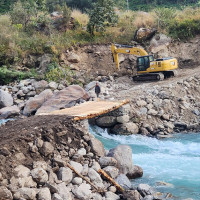- Thursday, 25 December 2025
Ecosystem Solutions For Health
Human health is largely anchored in socio-cultural and political contexts in human history and civilisation. It is closely linked to nature, environment and biodiversity. However, their intricate relationships are complex and poorly understood. More importantly, people’s health and illness narratives are socially embedded within and across cultures.
The compelling examples of natural disasters and pandemics such as COVID-19 reveal that biodiversity affects physical health. There is growing evidence that the health outcomes are shaped by socio-ecological systems which constitute poverty, social inequalities, environmental degradation and neglected tropical diseases.
Considering the ecosystem as structural and functional interrelationships among living organisms and the environment of which they are a part, there is growing interest and rationale for examining how culture and environment mutually influence each other. This contributes to a new perspective to learn more about intimate interactions between humans and their environments.
Public health has changed drastically in the 21st century. From primitive societies to a modern social world, health and well-being are shaped by intersecting social, economic, cultural and political challenges. Rooted in the history of human civilisation, the ecosystem approach to health provides a wider perspective on political ecology and health. Considering global health issues, ecosystem solutions for health are historically underacknowledged. In a broader cross-cultural context, the emerging issues of climate change, air pollution, deforestation, water scarcity and degrading environmental health are particularly concerning for policy makers, health care providers and communities who are yet to engage in critical conversations surrounding the ecosystem solutions for health.
In the context of human dimensions of global change, there needs to be a cross-disciplinary approach to further explore the close relationship between the human organism and its social environment. The spatial distributions and interactions of people, land and the resources they utilise demonstrate people’s behaviour and social environments at scale.
Health is considered an important resource for everyday life. Thus, a stable ecosystem is one of the prerequisites for human health and social well-being. Seeing culture as a function of ecosystem, the explanation at the interface between social and ecological science concludes that the wide and detailed knowledge of plant and animal species, climate, topography, land use and soils makes up ethno-scientific evidence of indigenous people and their demands on resources of the ecosystem.
Therefore, there is now a growing interest to explore how cultures and societies interact with their environments, and how environmental changes affect the everyday lives of communities. Across generations, human-environment interactions are particularly relevant around the issues of climate crisis, environmental health, and conservation of forest biodiversity.
My recent ethnographic field research in Raksirang of Makawanpur also reveals that indigenous communities such as Chepangs have historically developed their own languages, knowledge systems and cultural practices responsible for managing natural resources, farming and harvesting crops. They have their own cultural beliefs about health and illness which are socially embedded for years. They love their own land, traditional homes, and food and deeply appreciate the tremendous benefits of natural resources in everyday life. However, this is gradually changing as modernity, social inclusion, diversity, neoliberal policies, and social hierarchies largely govern people and their livelihoods at large.
Appreciating a profound interconnectedness of ecosystem, health and sustainable livelihoods, they have unique cultural values as they view natural resources as sacred and practice rituals to honour or protect them. Thus, persistent social, cultural, religious and environmental patterns are salient features of a society which are closely related to subsistence activities and economic arrangements.
Working closely with the communities for developing culturally appropriate ecosystem solutions for health is an emerging priority for actions. This will help explore and respond to the healthcare needs of the communities whose indigenous ecological knowledge, skills and experiences can be a useful resource for decision-making. While formulating new health policies, inclusion of environmental anthropologists, ecologists and geographers can provide valuable insights into ecological systems, human-environment interactions, and spatially informed strategies in addressing a wide range of environmental health issues and concerns. From an ecological anthropology perspective, the role of the physical environment is particularly significant in cultural change within and across societies. As we continue to face geopolitical tensions and economic uncertainties, the ongoing efforts for ensuring equitable access to quality health care are not sufficient. Moreover, it is high time to promote planetary health, which simply points out the health of human civilisation and the state of the natural systems on which it depends. Notably, Nepal’s health policy and strategic priorities have no sustained focus on planetary health.
Even though the health sector strategic plan (2023-2030) has called for multi-sector actions to address wider determinants of health, there lacks effective coordination and collaboration with other relevant sectors beyond health. High-level coordination platforms are not active due to the competing interests and priorities of the diverse sectors.
In this context, there is an emerging need to effectively implement a One Health strategy and strengthen climate-resilient health systems in the federal context. The strategy particularly aims to connect and promote human, animal and environmental health in a holistic approach.
Because of changing trends within global systems, it is interesting to explore how social groups in local communities are interacting with their ecosystems. Greater understanding of environmental issues is crucial to build native perceptions of their own ecosystem and sustain themselves on available natural resources. In many societies, indigenous communities are particularly vulnerable in terms of their changing livelihoods due to degrading natural resources, deforestation, and loss of biodiversity.
Additionally, people’s adaptive responses during earthquakes, landslides, heavy rainfall, and pandemics such as COVID-19 are particularly relevant in terms of building resilient and sustainable ways of life. However, there are little insights into how humans have adapted to different environments over time. Moreover, human activities have been largely responsible for impacting those environments.
An interdisciplinary perspective on health requires a holistic approach to explore how people are experiencing climate change and degrading environments in their everyday lives. Issues of inclusion, equity, diversity and environmental justice are key concerns in health sector reform. Using a transdisciplinary approach, integrated ecology and health challenges that arise from public health and veterinary medicine, biodiversity conservation and ecosystem management should be addressed in health policies and strategic interventions.
The emerging infectious diseases are greatly affecting people, wildlife, livestock and plants. From socio-ecological perspectives, there is limited research and practices linking human and animal health. The growing concerns and impacts of urbanisation, migration, population growth and land use on health and ecosystems are poorly understood and documented. Unfortunately, there are limited knowledge-sharing opportunities around diverse issues of the ecosystem approach to health.
While the profiles of diseases in societies change over time, medical pluralism can define and redefine the health and illness narratives within and across social groups. Local understanding of social sufferings and healings are historically nurtured, patterned and influenced by differences in social position in most societies.
As of now, the ecosystem approaches to reduce infectious and chronic diseases are largely overlooked. In this scenario, mapping of ecosystem services for health, equity and sustainability can help identify socio-ecological determinants of health. Therefore, ecosystem solutions for health largely promote systems thinking and harness transdisciplinary approaches to health, ecosystems and society. Of course, this approach should be a national sustainability agenda to achieve more gains in health and social wellbeing.
(Bhandari is a health policy analyst and has an interest in anthropology.)





-square-thumb.jpg)










